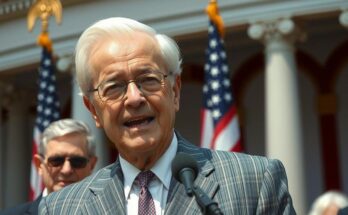Lebanon’s lawmakers elected Joseph Aoun as president, ending a two-year vacancy. Aoun, facing critical challenges, pledged to oversee reforms and increase state control over arms. His election marks a pivotal moment for Lebanon amidst economic crises and internal strife, drawing both national celebration and international scrutiny.
On Thursday, Lebanon’s parliament elected Army Chief Joseph Aoun as the country’s new president, ending a two-year vacancy in the position. Aoun, who is set to celebrate his 61st birthday, received widespread applause as he donned a dark suit rather than his typical military uniform to take the oath before the assembly. He expressed that this moment signifies a turning point in Lebanon’s historical narrative. Among his immediate responsibilities will be to establish a ceasefire in southern Lebanon and appoint a prime minister capable of implementing critical reforms needed to address the nation’s severe economic crisis.
Aoun has committed to enhancing the state’s control over weapons, particularly in light of the recent conflict involving Israel and Hezbollah. He emphasized the importance of creating a comprehensive defense strategy involving diplomatic, economic, and military dimensions aimed at addressing Israeli aggression and bolstering Lebanese sovereignty. Following the announcement, celebrations erupted in his hometown of Aishiyeh, where supporters gathered to express their joy with patriotic displays. The parliamentary vote saw 99 out of 128 lawmakers endorse Aoun, marking him as Lebanon’s fifth army commander to ascend to the presidency.
The selection of Joseph Aoun comes at a time when Lebanon’s political atmosphere is fraught with challenges. Since the conclusion of the civil war in 1990, the president’s authority has been curtailed, but the role remains vital for initiating the search for a new prime minister. Observers highlighted the intricate power-sharing norms that dictate the presidency’s affiliation with the Maronite Christian community. Aoun’s election unfolds amid a backdrop of international scrutiny and previous electoral disputes, reflecting ongoing tensions between Hezbollah and its detractors. Commentators assert that despite potential hurdles, Aoun’s presidency could pave the way for political stability and economic recovery in Lebanon.
Lebanon has experienced a prolonged political vacuum since former President Michel Aoun’s term ended in October 2022. The election of Joseph Aoun comes at a critical juncture, with Lebanon grappling with an unprecedented economic crisis exacerbated by internal divisions and external pressures. Historically, the Lebanese presidency is linked to the Maronite Christian sect, thus necessitating political alignment to navigate the multi-confessional governance system. The protraction of the previous presidential vacancy has instigated concerns about the nation’s stability and governance structures, especially in light of Hezbollah’s significant political influence and recent military conflicts.
In conclusion, the election of Joseph Aoun as Lebanon’s president symbolizes a significant step towards restoring governance in a country that has faced considerable turmoil. His presidency will confront crucial challenges including economic reforms, securing a ceasefire in conflict zones, and establishing a defense framework amid ongoing tensions with Israel. The political landscape remains complex, but Aoun’s leadership may herald an era of much-needed stability in Lebanon.
Original Source: www.bryantimes.com




